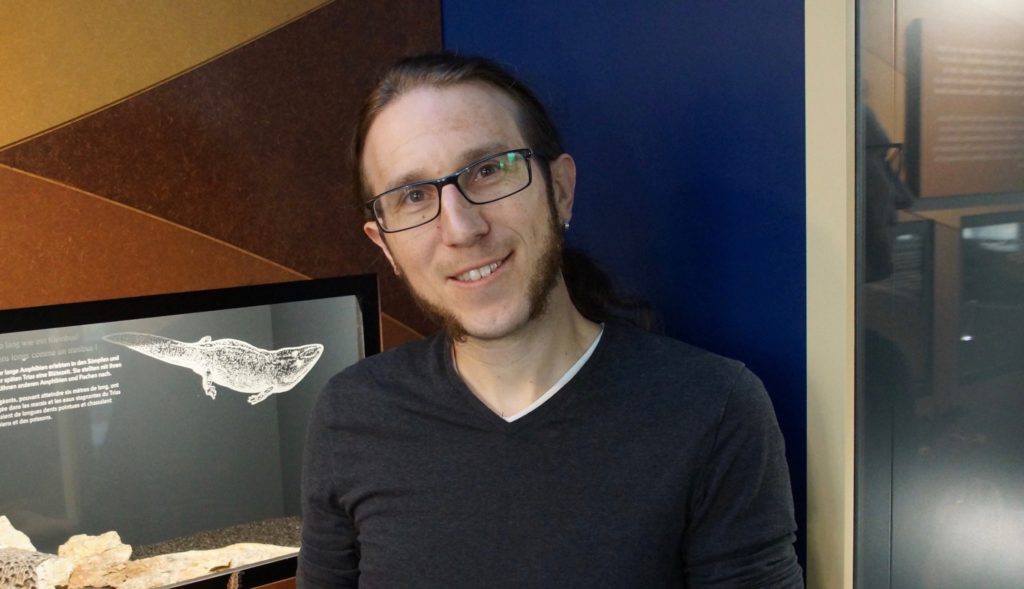BACK TO RESEARCH WITH IMPACT: FNR HIGHLIGHTS
BACK TO RESEARCH WITH IMPACT: FNR HIGHLIGHTS

Thanks to a unique exhibition at Luxembourg’s Natural History Museum, palaeontologist Ben Thuy has enriched both the music scene and the world of science.
There are two models of the ‘Melusinaster alissawhitegluzae’ basket star: one can be found at the National Museum of Natural History (MNHN), while the other takes pride of place in the studio of its eponym, Alissa White-Gluz. The latter – singer of the Swedish extreme metal band ‘Arch Enemy’ – was presented with the basket star replica during a concert at the Rockhal.
The person who chose the name and handed over the replica was palaeontologist Ben Thuy – all in the name of a really extraordinary project. Last year, the MNHN researcher organised an exhibition entitled ‘Rock Fossils’ together with his colleague and fellow palaeontologist Lea Numberger-Thuy, thereby building a bridge between two worlds that at first sight appear to have little in common, i.e. palaeontology and rock music. So how do the two go together?
Revealing a connection that has long been present in the underground
“Both share a passion for the obscure and hidden” explains Ben Thuy. “And both notoriously tend to cross boundaries.”
The researcher already proved the latter with the very idea of the exhibition funded by the FNR’s ‘PSP Classic programme’. In addition to the presentation, the varied programme of ancillary events included interactive debates, workshops, concerts by bands such as Arch Enemy and expeditions to explore the origin of rock fossils.
In doing so, the Natural History Museum researcher revealed a connection that has long been present in the underground. Ben Thuy is by no means the only palaeontologist with a pronounced passion for rock and metal music, as can be seen by the number of rock bands or musicians who have lent their names to fossils.
Fossil remains are a scientific sensation
In addition to the ‘Melusinaster alissawhitegluzae’, the Luxembourg palaeontologist also named another fossil after Arch Enemy, i.e. the ‘Melusinaster arcusinimus’. This is another basket star species which, like the other fossil, also belongs to the Gorgonocephalidae family.
Ben Thuy and his colleague Sabine Stöhr from the Swedish Natural History Museum analysed the tiny fossil remains that had been discovered in Germany and Luxembourg and discovered that the creatures in question were a kind of transitional form between Gorgonocephalidae and “normal” basket stars – a scientific sensation!
According to the researchers, the fact that many extinct species have been named after rock stars is living proof that there is passion behind science. To a certain extent, music offers a source of inspiration, and this was certainly the case for Ben Thuy. He listened to and drew inspiration from the Swedish band’s music while carrying out his research on the fossils, and one thing led to another.
A source of enrichment for science
“It’s a real honour”, declares the singer. “The fact that such an important discovery was made while the palaeontologist was listening to our music is something quite special. Combining art and science in this way is impressive”, affirms Alissa White-Gluz. The vocalist not only expressed her delight about this extraordinary link between palaeontology and metal music in front of approximately 1,000 fans at the Rockhal concert when the replica was handed over, she also shared it with her 800,000 Facebook followers.
“We had no idea that the musicians and fans would respond so enthusiastically”, says Ben Thuy.
He is convinced that actions such as these are a source of enrichment for science. Reaching such a broad audience with such tiny fossils is something many of his colleagues can only dream of. And with the chance to appear on stage with one of his favourite bands as well – what more could a palaeontologist who loves metal music possibly wish for?
This success story originates from the FNR 2018 Annual Report – view the Annual Report as PDF or interactive digital version
More about Ben Thuy
More from the domains Life Sciences, Biology & Medicine
More PSP highlights

PSP Classic
The aim of the funding programme Promoting Science to the Public (PSP) is to bring science closer to society, in particular Luxembourg’s society. The scheme funds projects that allow the target audience to come into contact with science and research interactively.
DOMAIN: SR – Environmental and Earth Sciences
CALL YEAR: 2018
FNR COMMITTED: 26,500 EUR
PERIOD: 07.06.2018 to 19.11.2018